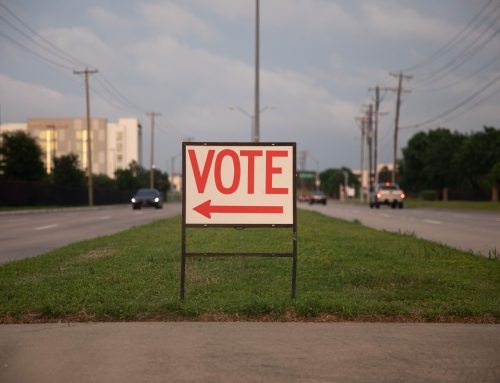
Dallas ISD Chief of School Leadership Stephanie Elizalde speaks at a parent meeting about class rank changes at Woodrow Wilson High School. (Photo by Jaime Dunaway)
Just days before graduation, some Woodrow Wilson High School students received a new class rank because of a Dallas ISD administrative error that changed the number of credits awarded to certain courses.
The error occurred in summer 2018, before the school year started, when the Texas Education Agency made credit changes to more than 100 courses during a yearly review. Some changes included doubling the number of credits for several International Baccalaureate courses.
Woodrow is the only DISD school with graduating seniors in the IB program and was, therefore, primarily affected. Several students had already completed IB courses that were later changed. Those students received only one credit. Had they waited until this year, they would have received two credits.
Essentially, some students took the same class and did the same work but got more credit.
After the TEA published the updated course manual in July 2018, it was distributed to Texas districts. DISD administrators were supposed to program the changes into the student information system, but an audit in April 2019 revealed that course credits were not changed accurately, according to a district memo sent to parents at Woodrow.
“I recognize it’s a big deal,” said Stephanie Elizalde, chief of school leadership for DISD. “It’s embarrassing. I’m responsible. There are several ways we can address and mitigate what’s happening.”
The district corrected the error in April, causing students to rise or fall in the class ranking.
“What is so disheartening is to have administrators insist it was the right thing to do because a code told them so,” Woodrow’s IB Parent Organization President Francie Hansen said in an email. “They are students who really worked hard and deserve to have their work appropriately represented no matter if they were first or 250th in the class. They are students not codes.”
Was the change mandatory?
Declining to implement changes mandated by the state was not an option, Elizalde said. But parents who contacted the TEA directly said that’s not true. At a meeting Thursday night, parents said Monica Martinez, associate commissioner for standards and programs at the agency, told them the district could award proportional credit, according to the Texas Education Code.
Elizalde said she contacted Martinez’s office twice, but the calls had not yet been returned.
“If I didn’t have to do it, I wouldn’t do it,” Elizalde said. “Because I didn’t do it in a timely manner doesn’t mean I don’t have to follow the law. If someone in authority tells me I’ve misinterpreted it, I will revert back.”
At Thursday’s contentious meeting, parents asked why the district did not inform them of the changes until after they had sent the final class rank. They also questioned the fairness of the system during a question-and-answer time in which many parents spoke over each other in an effort to have their question answered.
Several students were also in attendance holding signs that read, “Woodrow needs to be fair to all students.”
What next?
The district will work to mitigate the effects the changes have had on college admissions and scholarship applications, Elizalde said.
In Texas, several colleges automatically admit students based on class rank. For example, the University of Texas automatically admits the top 6 percent, and Texas A&M automatically admits the top 10 percent.
Elizalde said only one student fell out of the top 10 percent because of the changes, but students said they know classmates who have dropped 20-30 spots. The district official said students are accepted or not accepted to universities based on their rank at the end of the fall semester, but that may not be true for scholarships or membership in organizations like sororities and fraternities. If scholarships are rescinded or membership is denied, Elizalde said the district would write letters explaining what happened on behalf of students.
Although graduates may not have to worry about college admission, the same can’t be said for rising juniors in the IB program. The class of 2020 was ranked in January, and many students planned on using that rank for college applications this summer. It remains unclear how the change will affect those students.
The district will calculate the rank for rising seniors June 13 and will have meetings with individual students after that to discuss how to proceed.
To avoid similar problems in the future, Elizalde said the district will run audits in September, December and April to ensure changes have been received an implemented.





